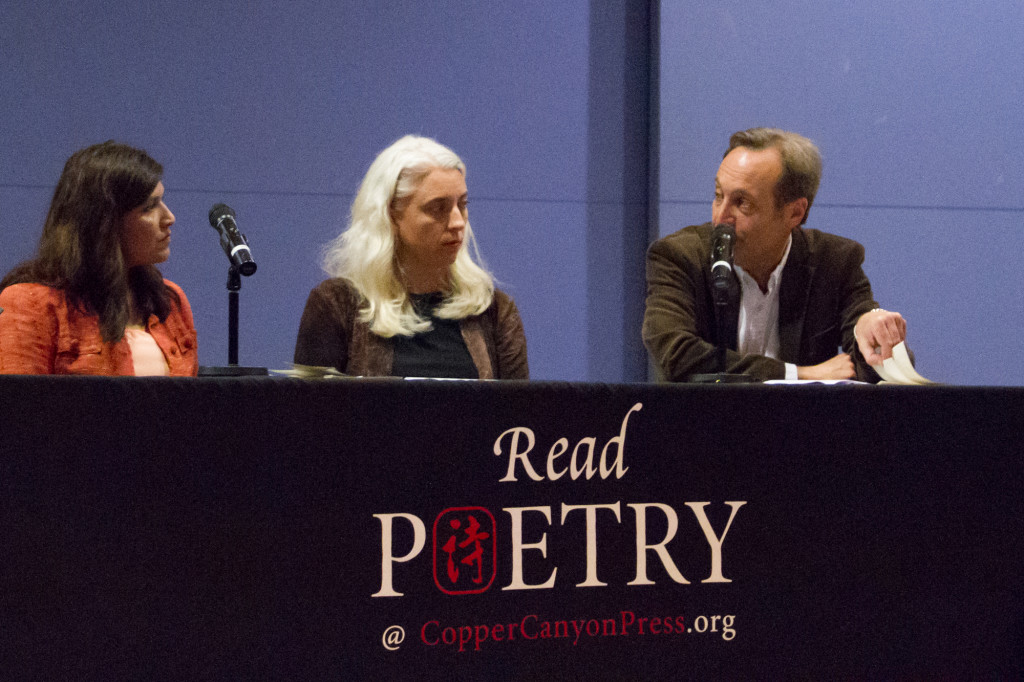It was the same old Pigott Auditorium, but the imploring request for everyone to “please sit closer” was a compelling invitation to get lost in the words of journalist and author Jeffrey Brown.
Brown has traveled the world as the chief correspondent for arts, culture and society at PBS NewsHour. But this past Monday, Brown was back in Seattle to hold a lecture on his recent book, “The News,” a collection of poems weaving together stories he’s encountered in his travels with poetic portrayals of the places he’s seen and people he’s met.
Brown endeavors to pursue and portray the truth in all of his work—whether in poetry or in news—and his passion throughout the night captivated the audience, persuading them to view the world in all its various, overwhelming forms.
We sat down with Brown to get the scoop on his new book and his unique outlook on poetry.
Vikki Avancena: You mentioned in your lecture that poetry and journalism portray different kinds of truth. How do you reconcile those two?
Jeffrey Brown: On the one hand we separate them clearly, because if I’m doing the newscast, it’s a true story in the journalistic sense. We ask questions, report the story and check our facts. Poetry is just a different way of telling things. It’s using your imagination. It doesn’t have to be true in the sense that the journalism has to be true, but it uncovers truths. It’s a different way of thinking about the truth. It’s not truer, but in some ways it’s not less true, just a different kind of truth. I think we as humans can reconcile those differences.
VA: What inspired you to write poetry as opposed to using a different art medium?
JB: I’ve written poetry for a long time. I wrote a lot when I was young, and then I didn’t for a long time, and then I would come back to it. I realized that poetry was a wonderful way to re-experience some of the things that I had experienced. It was a good way to re-imagine things and ultimately a good way to retell them. I thought that was interesting because I’ve gone back to look at places I’ve [been] and people I’ve met and realized that I told one story but there was more to tell. There was more that I knew and felt, and poetry was the best way to do it.
VA: How did you choose which narratives to include in your book?
JB: I’m not really sure. In some cases they just jumped out at me because of a phrase or it was a moment. In other cases it was just the overall experience that was so big, like going to the Middle East or Haiti. In some cases it was a particular line that stayed with me and I wanted to explore that. They all had different reasons and causes, and there were many others that I couldn’t figure out a way to [finish] them.
VA: Why do you think liberal arts are still important today?
JB: I know that for me it provided a great grounding and a great sense of understanding of history, culture and literature. It became a way to understand people and the world. I just found that in everything I did ever after, even if it wasn’t playing directly into what I was doing, it was there somehow. If I’m reporting on something that’s happening today, it allows me to think of where the people or the ideas of that came from. I think it’s tremendously important for those of us who know we got something out of it to speak about it in society today.
VA: What do you hope students will gain from your lectures?
JB: I just want college students to have the broadest experience that they can. I know that there’s a lot of pressure these days on young people to sort of feel like they have to know exactly what they’re going to be and they have to be focused. I understand that because there are pressures in our society and the cost of college is high, but college is a place to experience as much as you can and to open yourselves up to different things. Try different things because you never know.
I never knew what I was going to be in college and I ended up finding my way toward something unusual—classics and studying ancient Greek. Nothing is more impractical than that. But I’m so grateful that I had the experience of learning it because it taught me how to learn and it taught me a lot about the world.
Vikki may be reached at vavancena@su-spectator.com
Sonora Jha is faculty adviser for the Spectator.








